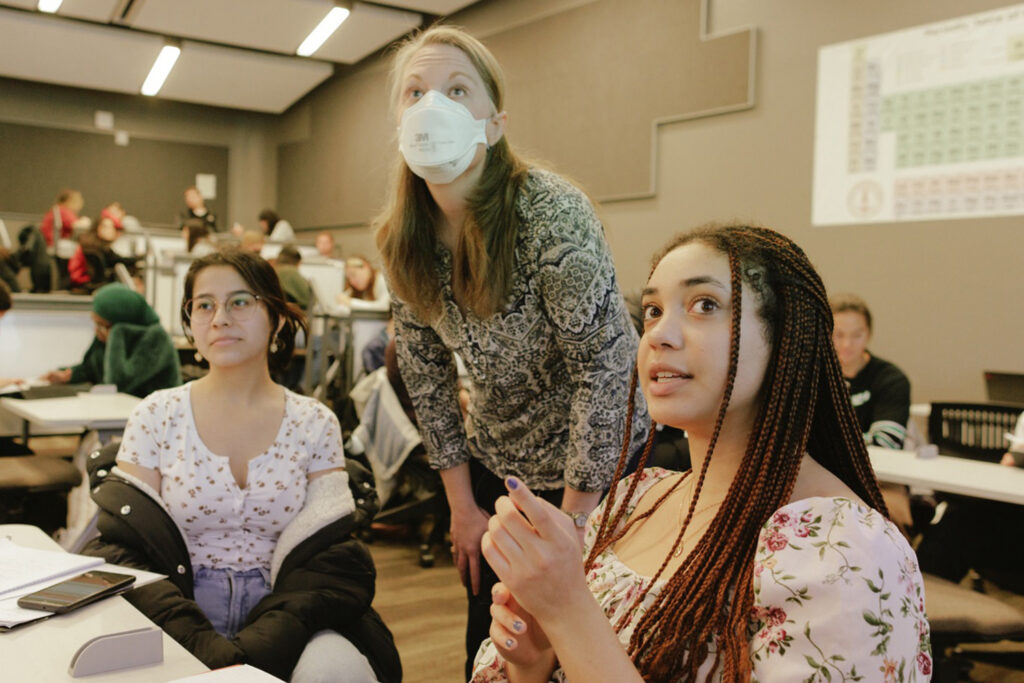Curriculum transformation projects gain momentum
Six instructional teams across campus have made it their mission to ensure that all Stanford students can experience belonging and success in their disciplines.

Through the Curriculum Transformation Project, the chemistry department is working to create a sustainable “on-ramp course” called CHEM 11 that can support students with chemistry and problem-solving. (Image credit: Micaela Go)
Curriculum transformation projects are flourishing across Stanford, with the aim of enhancing the undergraduate curriculum and making courses more equitable and accessible for all students.
The Curriculum Transformation Project (CTP) was launched in spring 2023 as a seed funding opportunity and is guided by the Curriculum, Equity, and Innovation, a working group of the Office of the Vice Provost for Undergraduate Education’s Leveling the Learning Landscape initiative. The effort, funded by an anonymous donor, spans the three undergraduate schools, supported by VPUE and the deans of the School of Humanities and Sciences, the School of Engineering, and the Doerr School of Sustainability.
Instructional teams applied last spring to join the Curriculum Transformation Institute (CTI), facilitated by the Center for Teaching and Learning (CTL) and the three-day summer institute helped teams generate ideas, formulate goals, and develop their grant proposals. The CTL-guided sessions also provided participants with the time and knowledge to develop ideas and a sense of community with other educators.
Six teams secured seed grant awards and are moving forward with their projects.
The team in physics is addressing challenges with the large – approximately 500 students a year – introductory course, PHYSICS 41: Mechanics. The challenge is to ensure that all students in PHYSICS 41 can be successful and find it engaging and satisfying, regardless of their preparation.
Associate Professor Lauren Tompkins serves as project faculty lead and said, “It’s exciting to be able to work with colleagues on how best to meet Stanford students where they are for introductory physics. It’s been great to have the resources of the CTP to implement research-tested teaching methods.”
Like physics, the chemistry department also aims to create a sustainable “on-ramp course” called CHEM 11 that can meet incoming students “where they are at” in their chemistry and problem-solving.
The Center for Comparative Studies in Race and Ethnicity is working across its offerings to transform curriculum by creating stable, interconnected gateway courses that address critical challenges, and build competency in core concepts and community among students and instructors. The CCSRE team said the CTL Curriculum Transformation Project allowed the working group to have access to “expert knowledge in constructing state-of-the-art curricula and in assessing their effectiveness at both the planning and implementation stages.”
CTL supports instructional teams through regular quarterly programming and meetings, check-ins and consultations, and providing expert guidance in developing project evaluations and assessments, critical to measuring the success of and gathering feedback on these innovations.
“I am thrilled with the scope, creativity, and dedication of these teams and their vision for undergraduate learning in their majors and minors,” said Cassandra Volpe Horii, associate vice provost for education and director of the CTL, who also co-chairs the CEI working group and is a member of the L3 steering committee. “As projects continue with planning and implementation this year and next, and as we prepare to welcome a new cohort of projects into this program, I anticipate we’ll start to observe interconnected, positive changes for students. Teams have already been sharing practices and coordinating in new ways, which we hope to amplify and sustain.”
Instructional teams with ideas for new projects to begin in the 2024-25 academic year are invited to apply for the next CTI by April 7. Get started on the CTI Call for Participation and Timelines page.